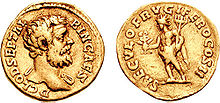
Back Emgann Lugdunum Breton Batalla de Lugdúnum Catalan Slaget ved Lugdunum Danish Schlacht bei Lugdunum German Batalla de Lugdunum Spanish Bataille de Lugdunum French Slach by Lyon Frisian Battaglia di Lugdunum Italian Pugna apud Lugdunum Latin Pertempuran Lugdunum Malay
This article needs additional citations for verification. (July 2022) |
| Battle of Lugdunum | |||||||
|---|---|---|---|---|---|---|---|
| Part of the Year of the Five Emperors | |||||||
 Clodius Albinus, as Caesar, 193–195 AD. AV Aureus (7.22 gm, 5h). Rome mint. Struck 194 AD. | |||||||
| |||||||
| Belligerents | |||||||
| Roman units from Pannonia, Illyricum, Moesia, and Dacia | Roman units from Britannia and Hispania | ||||||
| Commanders and leaders | |||||||
| Septimius Severus | Clodius Albinus † | ||||||
| Strength | |||||||
| 65,000 | 55,000 | ||||||
| Casualties and losses | |||||||
| Unknown but severe | Unknown but severe | ||||||
The Battle of Lugdunum, also called the Battle of Lyon, was fought on 19 February 197 at Lugdunum (modern Lyon, France), between the armies of the Roman emperor Septimius Severus and of the Roman usurper Clodius Albinus. Severus' victory finally established him as the sole emperor of the Roman Empire following the Year of the Five Emperors and immediate aftermath.
This battle is said to be the largest, most hard-fought, and bloodiest of all clashes between Roman forces.[1] According to English historian Edward Gibbon, the Roman historian Cassius Dio placed the total number of Roman soldiers engaged for both sides combined at 150,000.[2] Historian Michael Kulikowski states that Severus led the much larger force with the combined legions of Dacia and the Danubian provinces.[3] Historian A. J. Graham supports Gibbon's number of 150,000 soldiers in total, rather than the sometimes cited number of 300,000 in total and therefore 150,000 on each side, which he states to be a commonly accepted mistranslation of Cassius Dio's original language.[4] Graham also analyses the possible forces available to Albinus and states that the numbers on each side could have been roughly equal.[5]
- ^ Taylor, Ira Donathan (2016). Roman Empire at War : A Compendium of Battles from 31 B.C. to A.D. 565. Barnsley, South Yorkshire: Pen et Sword Military. p. 137. ISBN 9781473869080.
- ^ Gibbon, Edward. The Decline and Fall of the Roman Empire. Volume 1. Chicago: Encyclopedia Britannica, Inc., 1952. Great books of the Western world, volume 40. OCLC 916867. pp. 48, 685. Citing Cassius Dio 1, Book lxxv, p. 1260.
- ^ Kulikowski 2016, pp. 86–87.
- ^ Graham 1978, p. 628.
- ^ Graham 1978, p. 629.